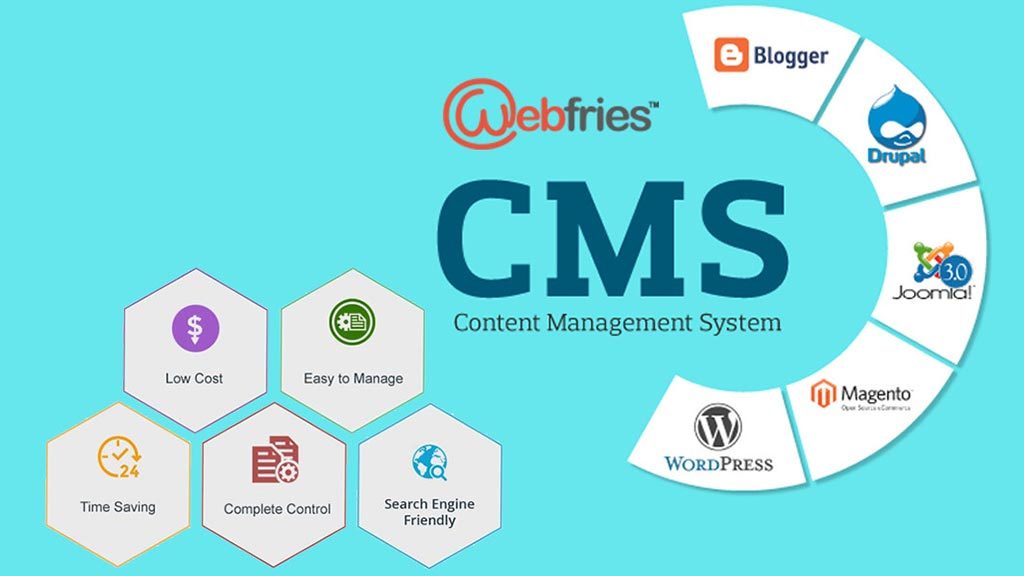Are you a business owner looking to set up a website for your brand? As you begin to set up your web presence, you’re faced with some hard choices like – whether to implement a Content Management System (CMS) for your site or to take the manual, hand-coded route.
Before CMSes became popular, web developers had to hand-code the web pages on their machines and upload them via an FTP program to the server. Once, this process is complete, the content is made available on the websites. If a developer had to modify anything, then they would have to redo the whole process all over again.
This old-school way of hand-coding web pages is nearly obsolete now. With the increase in popularity of CMSes, web developers no longer manually code individual pages. However, a small set of developers prefers custom CMSes compared to out-of-the-box solutions like Drupal and WordPress.
Let’s take a step back and start at the very beginning, to help you arrive at the right solution that suits your needs.
First things first, what exactly is a Content Management System?
A CMS doesn’t refer to any particular product or technology. Instead, it’s a catch-all term that is used to describe a broad set of processes that are predicted as the backbone of all future, next-gen websites.
It’s technically a web application that provides you with all the required tools to manage both online content and web users. Specifically, it’s software that helps in creating and maintaining websites.
One of the biggest draws of a CMS is that you don’t need HTML or other coding knowledge to create or modify a web page. Every CMS has a dashboard or an administration area that helps you to upload and edit the content as and when required. Better still, you can access this admin area via any regular web browser. You don’t need specific client software.
In a nutshell, a CMS brings the power of designing and modifying websites to the layman eliminating the need for a technical expert or a webmaster.
Top Ten Ways in Which a CMS Makes Life Easy for Website Owners
While different CMSes have specific features, here in this section, we list out the general benefits of using a CMS.
Content Control is in the Hands of the Content Creators
Before CMSes were introduced, if a company had to make a change to their existing website, they had to reach their developer and pay him to make the changes. This applied to all types of modifications from something as simple as updating a telephone number to major additions like create a new page for the site.
The previous method of hand-coding separated the web page owner (or content creator) from the developer. This made the content creator dependent on the developer to update or make changes to an existing site.
However, CMS abstracts the site design from the content creator. As a web page owner, you can modify, edit or add new content, without being bothered by the underlying web structure. You can make use of simple tools to add, delete or edit content with ease.
Ease of Content Management
A website is not a book where each section of content has a fixed location. On the contrary, a website is dynamically evolving, and managing content efficiently is the key to optimum performance. A particular block of text like the address, social media widgets, product descriptions are often repeated in several locations across the site. A CMS helps you to write content once and use it several times on the website.
SEO friendly
The web pages of today are massive and are evolving at a rapid pace. It is no longer possible for a single coder to manually write millions of code lines to power the entire website. You require several developers to work synchronously on different parts of the site. This can become problematic on the SEO front.
A CMS ensures that your site is SEO-friendly and checks if all the rules adhere. It helps in maintaining a coherent linking structure and creates search-engine-friendly URLs. If you want to improve web page rankings effortlessly, then CMS is the way to go.
EXTENSIBILITY
Almost all popular CMSes are modular. New functionality can be added to your site with extensions and plugins. For instance, if you want to include a social media widget on your site, you don’t have to write the code for it. Instead, download the required plug-in, assign it to a particular page on the site, and you’re done. With extensions and widgets, all the hard work is already done for you, simplifying your task.
REDESIGNING IS A BREEZE
When you design a static site, the content and design are interlinked making it difficult to change the appearance of your site. CMSes, on the other hand, make use of templates to separate the content from the design. This makes it easy to change and refresh your design, without worrying about content and codes.
ROBUST SECURITY
Since a CMS abstracts the code from the content; security vulnerabilities can be quickly rectified without any hassles. Also, most CMSes provide you with a one-click method of updating your entire site.
SIMPLIFIES YOUR TASK & SAVES YOU TIME
As a business owner, it’s natural that you want your site to look and perform the best. However, administration duties like deploying a site eat up a chunk of your time. Save energy, resources, and time by making use of a CMS. With a CMS, you don’t have to worry about the underlying code of your site, instead focus your time only on creating and updating content.
COST REDUCTION IN THE LONG-TERM
While a CMS has a high initial cost than a traditional website build, it’s worth it in the long run. If you’re building a dynamic site that requires frequent updates, a CMS will help you in cutting the long-term costs of having to hire someone to make every single change.
DISTRIBUTION OF CONTENT MANAGEMENT
A CMS assigns different roles to different users. For instance, some will be writers while others are designated as reviewers, editors, and publishers. Delegating tasks makes it easy to monitor the work and improves accountability and quickens workflow.
SCHEDULE CONTENTS TO FIT YOUR PUBLISHING TIMELINE
CMS gives you the flexibility to schedule different content at varying times. Additionally, you can set both the publishing and expiration date for time-sensitive content.
Features to Consider when Choosing a CMS
Now, that we’ve convinced you of the myriad benefits of a CMS, the next big decision is to decide the right CMS. Since, future updates, performance, user adaptation and the overall performance and aesthetics of your website depends on the CMS, you must ensure that you choose the right one with no margin for error.
Here are some factors to help you make a smart choice.
- Page Management: Check out if the CMS offers extensive page management facilities that assist you in restructuring content.
- Adding/Updating Content: Can you add, update content easily irrespective of the nature or size of the content?
- Template/Theme Choices: See if the CMS offers you a variety of themes that support customization.
- Flexibility in assigning user groups: If your organization has a team of users, then the CMS must support the collaboration of users and be able to handle multiple groups.
- Security: Does your CMS offer you bullet-proof security features?
- Code Generation: Does the CMS create clean codes that are SEO-friendly and load quickly?
- Support Community: Before choosing a CMS, ensure that it has a vibrant community of developers, documentation, and other support features.
A CMS IS THE BEST INVESTMENT FOR YOUR BUSINESS WEBSITE
Opting for a CMS for your site is one of the best investments you make not only for your site but your business. Your website is one of the important channels with which you communicate with your existing and potential clients. It’s imperative to make them fall in love with your business via your site. However, that doesn’t mean you have to spend countless hours trying to perfect coding. A CMS offers you simplicity with power so that you can concentrate on your core business practices without being bogged down by technical details.
Are you planning to build your online presence? Our skilled team of expert developers has worked on several CMS Based web development projects and develop your website on a Content management system that you can easily manage. For a website development company in Gurgaon, you can call us at +91 124-4379-633. We are also available 24×7 at www.webfries.com.


